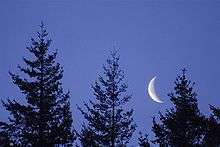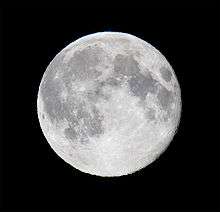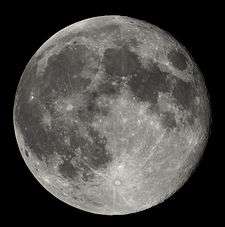Definify.com
Webster 1913 Edition
Luna
Definition 2026
Luna
Luna
English
Proper noun
Luna
- The name of Earth's moon.
- (Roman mythology) The sister of Aurora and Sol; the goddess of the moon; equivalent to the Greek Selene.
- A female given name.
- 1837 James Hogg, "The Mysterious Bride", Talks and Sketches: The Shepherd's Calendar (Blackie & Son), page 343:
- - - - and it so happened, that in one of old Bryan's daughters named Luna, or more familiarly Loony, he perceived, or thought he perceived, some imaginary similarity in form and air to the lovely apparition.
- 2003 J. K. Rowling, Harry Potter and the Order of the Phoenix (Bloomsbury, ISBN 0747551006), page 236:
- A few seconds later, Luna Lovegood emerged, trailing behind the rest of the class, a smudge of earth on her nose, and her hair tied in a knot on the top of her head.
- 1837 James Hogg, "The Mysterious Bride", Talks and Sketches: The Shepherd's Calendar (Blackie & Son), page 343:
- A given name for a female pet.
- (alchemy) Silver.
Translations
Coordinate terms
See also
Anagrams
Latin
Etymology

Pronunciation
- (Classical) IPA(key): /ˈluː.na/, [ˈɫuː.na]
Proper noun
Lūna f (genitive Lūnae); first declension
Declension
First declension.
| Case | Singular |
|---|---|
| nominative | Lūna |
| genitive | Lūnae |
| dative | Lūnae |
| accusative | Lūnam |
| ablative | Lūnā |
| vocative | Lūna |
Derived terms
- Lūnēnsis
References
- Félix Gaffiot (1934), “Luna”, in Dictionnaire Illustré Latin-Français, Paris: Hachette.
- Luna in William Smith., editor (1854, 1857) A Dictionary of Greek and Roman Geography, volume 1 & 2, London: Walton and Maberly
Slovene
Etymology
See lúna.
Pronunciation
- IPA(key): /ˈlùːna/
- Tonal orthography: lúna
Proper noun
Lúna f (genitive Lúne)
- the Moon (of Earth)
Declension
Synonyms
See also
Spanish
Pronunciation
- IPA(key): /ˈluna/
Etymology 1
Proper noun
Luna f
- Earth's Moon
- A female given name of modern usage.
Etymology 2
From dialectal Aragonese luna (“lights”), a habitational name for someone living by an open courtyard.
Proper noun
Luna f
- A surname.
luna
luna
English
Pronunciation
Noun
luna (plural lunas)
- (entomology) A luna moth: a member of species Actias luna.
- 1944, Elizabeth Enright, Then There Were Five, Farrar & Rinehart, page 80:
- “Gee,” whispered Oliver. He sat there staring. “A luna! I never thought I’d see a real luna!”
- 1969, Sterling North, “An Introduction to Butterflies and Moths”, in Boys’ Life, May 1969 issue, Boy Scouts of America, page 64:
- On the previous evening we had discovered with delight a luna with the fabulous moons, one on each pale green wing.
- 2010, Sally Roth (contributor), in Judy Pray (compiler), Garden Wisdom & Know-How: Everything You Need to Know to Plant, Grow, and Harvest, Black Dog & Leventhal Publishers, Inc., ISBN 978-1-57912-837-1, page 348:
- Spray BT on your young oak to protect against gypsy moths, and you wipe out future lunas, cecropias, and everything else on the leaves, along with the pests.
- 1944, Elizabeth Enright, Then There Were Five, Farrar & Rinehart, page 80:
- (Christianity, chiefly Catholicism and Anglicanism) A lunette: a crescent-shaped receptacle, often glass, for holding the (consecrated) host (the bread of communion) upright when exposed in the monstrance. [from 19th c.][1]
- 1907 May, “Dominicanus”, “The Rosary and the Blessed Sacrament”, in the Dominican Friars, The Rosary Magazine, Volume 30, Number 5, page 494:
- The Bread of Angels is first taken from the tabernacle, where it rests in the luna, and placed upon the altar, covered with a corporal. After genuflecting, the priest puts the luna containing the Blessed Sacrament on its throne—the monstrance—and elevates it […]
- 1917, John F. Sullivan, The Externals of the Catholic Church, BiblioLife, LLC (2009), ISBN 9781113714084, pages 115–116:
- This receptacle is called a “luna” or “lunula” (a moon, or a little moon), and has glass on either side, so that the Host may be seen when enclosed therein. […] ¶ […] ¶ The ciborium, the pyx and luna of the ostensorium are blessed with a simpler formula than that used for the chalice, and […] ¶ […] ¶ The chalice, the paten, the luna and the pyx are sacred things, true sacramentals, and are worthy of deepest reverence; for […]
- 2007, John Trigilio and Kenneth Brighenti, The Catholicism Answer Book: The 300 Most Frequently Asked Questions, Sourcebooks, Inc., ISBN 9781402208065, page 156:
- The luna, which is a piece of glass in the shape of a moon, contains the Blessed Sacrament, previously consecrated. The luna is then placed in the middle of the sunburst of the monstrance.
- 1907 May, “Dominicanus”, “The Rosary and the Blessed Sacrament”, in the Dominican Friars, The Rosary Magazine, Volume 30, Number 5, page 494:
Synonyms
Etymology 2
From the Hawaiian word luna (“leader; supervisor”).[2]
Noun
luna (plural luna or lunas)
- (Hawaii) A foreman on a plantation.
- 1922, U. G. Murphy, “The Japanese Problem in Hawaii: How the Task of Christianizing and Americanizing the Oriental is Progressing”, in The Friend, Volume 91, Number 6 (June 1922) page 130:
- There are several reasons why the Hawaiian-born Japanese boys and girls do not take kindly to plantation labor, but one of the chief reasons is the objection to the kind of lunas who oversee the work of the laborers.
- 1959, James Michener, Hawaii (novel), Fawcett Crest (1986), ISBN 9780449213353, page 737:
- […] haoles could not visualize Chinese or Japanese in positions of authority. And from sad experience, the great plantation owners had discovered that the Americans they could get to serve as lunas were positively no good. Capable Americans expected office jobs and incapable ones were unable to control the Oriental […]
- 2000, Sally Engle Merry, Colonizing Hawai'i: the cultural power of law, page 321:
- After the day was over I went to the luna to count my day but he would not. Then I went to him the second time and he said he would not put it down.
-
2012, Julia Flynn Siler, Lost Kingdom, Grove Press, p. 35:
- Capital punishment was outlawed by the government but some plantation managers and luna still delivered lashings and other forms of abuse.
- 1922, U. G. Murphy, “The Japanese Problem in Hawaii: How the Task of Christianizing and Americanizing the Oriental is Progressing”, in The Friend, Volume 91, Number 6 (June 1922) page 130:
Usage notes
- This noun, though inflected as an English word (singular luna, plural lunas), is frequently italicized as a loanword.
Anagrams
References
- ↑ “luna” in Don S. Armentrout and Robert Boak Slocum (editors), An Episcopal Dictionary of the Church: A User-Friendly Reference for Episcopalians, Church Publishing, Inc. (2000), ISBN 978-0-89869-211-2.
- ↑ 1986 , Mary Kawena Pukui, Samuel H. Elbert, Hawaiian dictionary: Hawaiian-English, English-Hawaiian, revised and enlarged edition (University of Hawaii Press)
Czech
Etymology
From Old Church Slavonic лоуна (luna), from Proto-Slavic *lunà, from Proto-Indo-European *lewk-. Cognates include Latin luna, Ancient Greek λύχνος (lúkhnos), Old Prussian lauxnos and Middle Irish luan.
Noun
luna f
Declension
Synonyms
Related terms
Esperanto
Pronunciation
- IPA(key): /ˈluna/
- Hyphenation: lu‧na
Adjective
luna (accusative singular lunan, plural lunaj, accusative plural lunajn)
Italian
Etymology
From Latin lūna, from Old Latin losna, from Proto-Italic *louksnā, from Proto-Indo-European *lowksneh₂, derived from the root *lewk- (“bright”).


Pronunciation
- IPA(key): /ˈlu.na/, [ˈl̺uːn̺ä]
- Hyphenation: lù‧na
Noun
luna f (plural lune)
- the Moon
- c. 13th century, Francis of Assisi, “Cantico di Frate Sole”, Biblioteca del Sacro Convento di San Francesco :
- Laudato ſi mi ſignore ᵱ ſora luna e le ſtelle, in celu lai foꝛmate clarite ⁊ p̃tioſe ⁊ belle.
- Be praised, my Lord, through Sister Moon and the stars; in the heavens You have made them bright, precious and beautiful.
- Laudato ſi mi ſignore ᵱ ſora luna e le ſtelle, in celu lai foꝛmate clarite ⁊ p̃tioſe ⁊ belle.
- 1472, Dante Alighieri, La divina commedia: Inferno, Johannes Numeister, Canto VII:
- [...] che tutto loro che ſotto laluna ¶ et che gia fu dequeſte anime ſtanche ¶ none potrebbe farne poſar una
- «[...] for all the gold that is beneath the moon, ¶ or ever has been, of these weary souls ¶ could never make a single one repose».
- [...] che tutto loro che ſotto laluna ¶ et che gia fu dequeſte anime ſtanche ¶ none potrebbe farne poſar una
- c. 13th century, Francis of Assisi, “Cantico di Frate Sole”, Biblioteca del Sacro Convento di San Francesco :
- (by extension) a planet's natural satellite; moon
-
(archaic, literary, figuratively) a month, moon
- 1321, Dante Alighieri, La divina commedia: Inferno, Le Monnier (1994), Canto XXXIII, p. 490 vv. 22, 25-26:
- Breve pertugio dentro da la Muda, ¶ [...] ¶ m'avea mostrato per lo suo forame ¶ più lune già, quand'io feci 'l mal sonno [...]
- A narrow perforation in the mew, ¶ [...] ¶ had shown me through its opening ¶ many moons already, when I dreamed the evil dream [...]
- Breve pertugio dentro da la Muda, ¶ [...] ¶ m'avea mostrato per lo suo forame ¶ più lune già, quand'io feci 'l mal sonno [...]
- 1321, Dante Alighieri, La divina commedia: Inferno, Le Monnier (1994), Canto XXXIII, p. 490 vv. 22, 25-26:
- (archaic, figuratively, by extension) a time of the year
- (alchemy) silver
- (heraldry) a full moon (as opposed to a crescent)
Related terms
Anagrams
Latin

Etymology
From Old Latin losna, from Proto-Italic *louksnā, from Proto-Indo-European *lowksneh₂, which is derived from Proto-Indo-European *lewk-. Cognates include Ancient Greek λύχνος (lúkhnos), Old Church Slavonic лоуна (luna), and Middle Irish luan, Persian روز (ruz) Persian رخ (rox).
Pronunciation
- (Classical) IPA(key): /ˈluː.na/, [ˈɫuː.na]
- (Ecclesiastical) IPA(key): /ˈlu.na/, [ˈluː.na]
Noun
lūna f (genitive lūnae); first declension
Inflection
First declension.
| Case | Singular | Plural |
|---|---|---|
| nominative | lūna | lūnae |
| genitive | lūnae | lūnārum |
| dative | lūnae | lūnīs |
| accusative | lūnam | lūnās |
| ablative | lūnā | lūnīs |
| vocative | lūna | lūnae |
Derived terms
|
Descendants
See also
References
- luna in Charlton T. Lewis and Charles Short (1879) A Latin Dictionary, Oxford: Clarendon Press
- luna in Charlton T. Lewis (1891) An Elementary Latin Dictionary, New York: Harper & Brothers
- LUNA in Charles du Fresne du Cange’s Glossarium Mediæ et Infimæ Latinitatis (augmented edition, 1883–1887)
- Meissner, Carl; Auden, Henry William (1894) Latin Phrase-Book, London: Macmillan and Co.
- the sun, moon, is eclipsed: sol (luna) deficit, obscuratur
- the moon waxes, wanes: luna crescit; decrescit, senescit
- the sun, moon, is eclipsed: sol (luna) deficit, obscuratur
- luna in Harry Thurston Peck, editor (1898) Harper's Dictionary of Classical Antiquities, New York: Harper & Brothers
- luna in William Smith, editor (1848) A Dictionary of Greek Biography and Mythology, London: John Murray
- luna in William Smith., editor (1854, 1857) A Dictionary of Greek and Roman Geography, volume 1 & 2, London: Walton and Maberly
- luna in Richard Stillwell et al., editor (1976) The Princeton Encyclopedia of Classical Sites, Princeton, N.J.: Princeton University Press
Polish
Etymology
From Proto-Slavic *lunà.
Noun
luna f
- (archaic) moon
Declension
Derived terms
Serbo-Croatian
Etymology
From Proto-Slavic *lunà.
Pronunciation
- IPA(key): /ˈluːna/
Noun
luna f (Cyrillic spelling луна)
- (dated, now rare) moon
Synonyms
Sicilian
Etymology
Pronunciation
- IPA(key): /ˈluna/
- Hyphenation: lù‧na
Noun
luna f (plural luni)
Derived terms
- luniddì
- lunariari
Slovak
Etymology
From Proto-Slavic *lunà, from Proto-Indo-European *lowksneh₂, from *lewk-.
Pronunciation
- IPA(key): /ˈluna/
- Hyphenation: lu‧na
Noun
luna f (genitive singular luny, nominative plural luny, declension pattern of žena)
- (archaic, poetic) moon
Declension
Synonyms
Derived terms
- lunárny
Slovene
Etymology
From Proto-Slavic *lunà.
Pronunciation
- IPA(key): /ˈlùːna/
- Tonal orthography: lúna
Noun
lúna f (genitive lúne, nominative plural lúne)
Declension
Synonyms
See also
Spanish
Etymology
From Latin lūna, from Proto-Italic *louksnā, from Proto-Indo-European *lowksneh₂, which is derived from Proto-Indo-European *lewk-. Cognate with Galician lúa, Portuguese lua, Catalan lluna, French lune, Italian luna, Occitan luna and Romanian lună.
Pronunciation
- IPA(key): [ˈlu.na]
Noun
luna f (plural lunas)